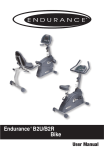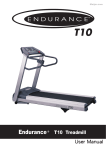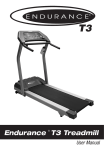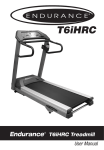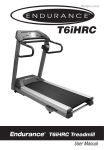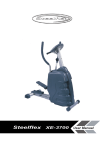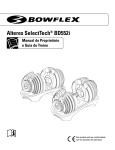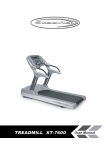Download Endurance e4 User manual
Transcript
E4 Endurance ® E4 Elliptical Trainer User Manual Endurance® wants to thank you for making the E4 a part of your exercise program. Our quality, durability and craftsmanship will enable you to enjoy the E4 for many years to come. We have included some general fitness guidelines that will help you in your pursuit of a healthy lifestyle. The E4 will enable you to customize and monitor your workouts to: • Increase your cardiovascular system • Increase your metabolism • Strengthen and tone your muscles • Help you maintain weight loss For a more comprehensive list turn to page 19. Whether you are a beginner or you are an avid exerciser, the E4 was designed to be an efficient, easy and enjoyable way to achieve an improved level of fitness. So take the next step and achieve that fit and healthy body you want. The on-board digital computer enables you to accurately monitor your progress by tracking speed, time, distance, calories and pulse. This Ownerʼs Manual contains the information you need to operate and enjoy your Endurance E4. Please read the manual in its entirety before attempting to exercise on the E4. Ready? Well, letʼs get started! 1 2 E4 Table of Contents SAFETY INSTRUCTIONS........................................... 5 CLEANING................................................................... 5 ASSEMBLY, MOVING, PLACEMENT.......................... 5 LEVELING................................................................... 6 FOOT POSITIONS...................................................... 6 HOW TO USE THE E4........................... 7 SYNCHROSTRIDE MOTION ARMS SETTINGS........ 7 E4 CONSOLE INSTALLING BATTERIES............................................ 8 CONVERTING FROM METRIC TO STANDARD........ 8 TURNING SCREEN DISPLAY ON.............................. 8 CHOOSING TIME AND STARTING............................ 9 COUNTING-DOWN / UP............................................. 9 PROGRAMMING DISTANCE...................................... 9 FEEDBACK DISPLAY.................................................. 11 TURNING SCREEN DISPLAY OFF............................. 11 ADJUSTING RESISTANCE..........................................11 GENERAL DEVELOPING A FITNESS PROGRAM....................... 12 WARM-UP.................................................................... 12 FLEXIBILITY................................................................ 13 EXERCISE GUIDELINES............................................ 18 ACHIEVING YOUR FITNESS GOALS........................ 19 SAMPLE GOALS......................................................... 20 KEEPING AN EXERCISE DIARY................................ 20 HEART RATE CONVERSION CHART........................ 22 3 E4 ELLIPTICAL TRAINER Console Hand Pulse Grips Tension Control Knob Beverage Holder Side Cover Foot Pedal Pedal Arm Front Foot & Transport Wheels Foot Pedal Adjusters Levelers 4 IMPORTANT SAFETY INSTRUCTIONS SAVE THESE INSTRUCTIONS! Failure to follow any of the following safety instructions may result in injury or serious health problems: • Use this exercise product only as intended and described in this Ownerʼs Guide. Do not use attachments not recommended by the manufacturer. • Never drop or insert any object into any opening, or on the Pedal Arm Guide Rails. • Do not place fingers, feet or any other objects into or near the moving parts of the E4. • Never turn foot pedals, pedal arms or crank arms by hand. • To avoid entanglement and possible injury, do not expose hands or arms to the drive mechanism. • Do not dismount the E4 until the pedals are at a complete STOP. • Warn bystanders to keep a safe distance away. Do not allow anyone (other than the user) to touch the machine while it is in operation. • Do not remove the E4 side covers. Only an authorized retailer should perform maintenance or repair services. • Do not use outdoors. CHILDREN • Keep children off and away from your E4 at all times! • When the E4 is in use, young children and pets should be kept at least 10 feet away. OTHER SAFETY TIPS FOR YOUR E4 • CAUTION! If you experience chest pains, nausea, dizziness or shortness of breath, stop exercising immediately and consult your physician before continuing. • Donʼt wear loose clothing that might catch on any part of the E4. • Read this Ownerʼs Guide in its entirety before operating the E4. CLEANING • Use a damp cloth to wipe your E4 and computer free of sweat and dust. Always avoid getting extra moisture on the computer. By keeping the computer face free of sweat, you can ensure a longer computer life. • Important Reminder: Never use petroleum - based solvents when cleaning. Doing so will damage the finish on your E4. ASSEMBLY If you have elected to assemble this product yourself, for your safety, please read and follow each of the steps in the enclosed assembly instructions. It is recommended that assembly be performed by an authorized retailer. If you have any questions regarding any part or function of your E4, contact your retailer. 5 MOVING YOUR E4 Your E4 has a pair of transport wheels built into the front foot. It is easy to move your E4 by picking up the back end and rolling it on the front transport wheels. PLACEMENT IN YOUR HOME It is important that you place your E4 in a comfortable and inviting room. Your E4 is designed to use minimal floor space. Many people will place their E4 facing the TV or a picture window. To make exercise a desirable daily activity for you the E4 should be in an attractive setting. LEVELING YOUR E4 If your E4 wobbles when you have placed it where you intend to use it, raise or lower the adjustable levelers located on either side of the pedal arm guide rail stabilizing foot. FOOT POSITION Your E4 has a large foot pedal, offering you a variety of foot positions. When using your E4 you may notice that your heel rises off the footpad. This is normal heel-toe-plant walking or running motion and you should not try to prevent this. 6 GLIDE POSITION Placing the foot pedal toward the back of the pedal arm (using the foot pedal adjusters located on the bottom portion of the foot pedal) will decrease your step height and keep the step pattern elliptical. Your workout will feel more like a ski glide, or smooth run or walk. STEP POSITION Moving the foot pedal to the front of the pedal arm (using the foot pedal adjusters located on the bottom portion of the foot pedal) will increase your step height. This will give you a more vertical stepping motion. This position is particularly effective for developing your quadriceps muscles. HOW TO USE THE E4 To start using the E4 simply stand on the foot pedals with the toes of your shoes close to the front edge of the foot platform. Place your hands in a comfortable position on the handlebars. Simply move your highest foot forward and follow the natural path of the machine. E4 MOTION HANDLES Working in unison with the adjustable resistance of the elliptical stride, the Motion Handles are designed to work your upper body in rhythm with your lower body. The ergonomic design encourages good posture and proper technique. When working with the Motion Handles for the first time, start out at a slow pace to get accustomed to the total body motion. 7 MOTION HANDLES E4 CONSOLE INSTALLING BATTERIES If your E4 batteries have not already been installed by your retailer, please install them now. The console uses two AA batteries. Install the batteries in the battery compartment in the back of the console. CONVERTING FROM METRIC TO STANDARD First flip the switch located in the reverse side of the panel. Then, take the batteries out and replace them. When the machine powers back up the readout will switch. TURNING THE SCREEN DISPLAY ON You can turn your console on by either pressing the RESET button at the bottom right of the console or by simply getting on your elliptical and beginning your stride. CLEARING PREVIOUSLY STORED INFORMATION Your elliptical will retain information from your previous workout such as calories and distance for a few minutes. You can clear this information by pressing RESET. CONSOLE FEEDBACK Your E4 provides you with the information you need for an effective workout every time. 8 TIME There are two modes of time display. You can choose either Count Up Mode to monitor the length of your workout or Count Down Mode for a programmed time limit. To operate in Count-Up Mode: Simply get on the elliptical and start striding. The console will automatically turn on and the time display will advance from zero and keep time until you finish your workout. To operate in Count Down Mode: Turn on the console by pressing the RESET button. Press the MODE button to cycle through the feedback windows until TIME is displayed. Next, press the "+" button until the desired number of minutes of your workout is displayed. Then, start pedaling. The TIME display will show your specified time counting down to zero. When you have reached your goal, the console will beep until you press the RESET button again DISTANCE The DISTANCE display will show the amount of mileage you have "traveled" in your workout. Keeping a record of your progress is a great motivational tool. You can also program the amount of distance you desire for your workout: To program a specific distance: Turn on the console by pressing the RESET button. Press the MODE button to cycle through the feedback windows until DISTANCE is displayed. Next, press the "+" button until the desired distance for the workout is displayed. Then, start pedaling. The DISTANCE display will show your specified mileage counting backwards to zero. When you have reached your goal, the console will beep until you press the RESET button again. SPEED This window readout will display your speed in miles per hour. 9 CALORIES The CALORIES display will show the approximate number of calories you burn during your workout. You can also program your elliptical to notify you when you have burned a specific number of calories. To program a Calorie Countdown: Turn on the console by pressing the RESET button. Press the MODE button to cycle through the feedback windows until CALORIES is displayed. Next, press the "+" button until the desired number of calories is displayed. Then, start pedaling. The CALORIES display will show your specified calories counting backwards to zero. When you have reached your goal, the console will beep until you press the RESET button again. PULSE The PULSE display will show your heart rate in beats per minute. During your workout, press the MODE button until PULSE is displayed. Next, grasp the inner upright handles with your palms on the heart rates sensors. After 10 seconds your heart rate will be displayed and will change as your heart rate changes. NOTE: Always consult a physician before starting an exercise program. This will be helpful in determining your target heart rate zone. 10 SETTING THE MAIN DISPLAY WINDOW The automatic display mode on your elliptical is SCAN MODE. In this mode, information from each of the feedback windows will automatically cycle on display in the main window. If you desire to keep one feedback function in the main window for quick reference, press the MODE button until the feedback function you desire is displayed. When it does, you will see your selected feedback information in the main window. TURNING THE SCREEN DISPLAY OFF. The elliptical console automatically shuts off after a few minutes of inactivity. ADJUSTING THE RESISTANCE OF YOUR STRIDE The elliptical's Tension Control Dial increases or decreases the resistance of your stride. You can change this setting at any time during your workout by rotating the dial clockwise for more resistance and counter clockwise for less resistance. 11 E4 ELLIPTICAL TRAINER Developing a Fitness Program Warm Up: Warming up is an extremely important phase, but unfortunately, itʼs often an activity that is ignored. Painful frustrating muscle pulls or strains may result from not warming up properly. There are two goals for warm up: warming up the muscles of the back and the extremities (so that you can stretch them without injury), and slight acceleration of the heart rate so the body can move gradually into the target heart rate zone. Warm ups should consist of 5-10 minutes of exercises that are not very demanding: marching in place, stepping side to side and swinging your arms, walking at a pace of 3 to 5 mph, etc. A gradual warm up will do the following: • Produce faster, more forceful muscle contractions • Increase your metabolic rate so oxygen is delivered to the working muscles more quickly • Lead to more efficient calorie burning by increasing your core body temperature • Prevent injuries by improving the elasticity of your muscles • Allow you to work out longer because your energy systems are able to exercise, preventing the build up of lactic acid in the blood • Improve joint range of motion • Psychologically prepare you for higher intensities by increasing your arousal and focus on exercise Warm up: Warm up 5 to 10 minutes before aerobic activity. Duration: Maintain your exercise intensity for 20 to 60 minutes. Cool Down: Gradually decrease the intensity of your workout, then stretch to cool down during the last 5 to 10 minutes. . NOTE: If weight loss is your major goal, a minimum of 30 minutes of aerobic activity five or more times per week is recommended. 12 E4 ELLIPTICAL TRAINER FLEXIBILITY Adequate flexibility is the ability to move your limbs and joints easily (through a complete range of motion) the way you need to in order to meet the challenges of daily life. Fortunately, there ís a positive reinforcing cycle between flexibility and activity. Adequate flexibility enables you to maintain an active lifestyle, and an active lifestyle makes an important contribution to maintaining adequate flexibility. These relationships grow stronger the older we become. When should I stretch? Any time is a good time to stretch. In the morning it can work out the kinks in your back. At work you can stretch and relax your neck and shoulders. After work you can stretch out your lower back. How should I stretch? Perform the following stretches slowly and smoothly until you feel a slight tugging sensation on the muscles involved. Donʼt stretch to the point you feel pain, and donʼt bounce - you could pull a muscle. Hold each stretch for 10 to 20 seconds. Exhale through the stretch, and breathe slowly. This will keep you from bouncing. 1. Calf ( back of lower leg) a. To do a straight knee stretch start with the leg to be stretched approximately three feet from the wall and the opposite leg on a step forward. Lean toward the wall, keeping your heels down and feet turned in slightly. b. To do a bent knee stretch start as above, but move approximately one foot closer to the wall and bend the knee of the back leg to be stretched. c. Repeat using the other leg. 13 E4 ELLIPTICAL TRAINER 2. Iliotibial Band (outside of hip) a. Start with the leg to be stretched one step back and behind the opposite foot. Move your hips sideways toward the side of your body being stretched. Keep the upper body away from the wall and do not bend forward. b. Repeat using the other leg. 3. Lower Back, Hips, Groin, and Hamstrings a. Stand with your feet about shoulder - width apart and pointed straight ahead. If you are reasonably flexible and need more of a stretch, cross one leg in front of the other for a few stretches, then switch legs. b. Slowly bend forward from the hips, always keeping your knees slightly bent. c. Stretch only to the point where you feel a tugging in the back of your legs. 14 E4 ELLIPTICAL TRAINER 4. Side Bends a. Stand with your feet about shoulder - width apart and toes pointed straight ahead. Keep your knees slightly bent and with one hand on your hip, extend your other arm up and over your head. Slowly bend at your waist to one side - toward the hand on your hip. b. Extend both arms overhead. Hold your left wrist with your right hand and bend slowly to the right, using your right arm to pull the left arm gently over the head and down toward the ground. c. Repeat with other side. 5. Quadriceps (front of thigh) a. Lying on our stomach, pull the heel toward your buttocks with the opposite hand. Keep the thigh of the leg being stretched close to the leg on the floor. Repeat with opposite leg. b. The same stretch can be done standing. Do not allow your thigh to come in front of you and do not bend forward at the waist. c. Repeat with opposite leg. 15 E4 ELLIPTICAL TRAINER 6. Groin (inside of thigh) a. Sit on the floor with the soles of your feet together. Gently push knees down toward the floor with your elbows. b. Stand with your feet three to four feet apart and turned out slightly. Keep the knee of the leg to be stretched straight, and bend the opposite knee as you move your body toward the bent leg. Keep your toes pointed forward. c. Repeat using the other leg. 7. Hamstrings (back side of upper leg) a. Sit with one knee bent and the leg to be stretched out straight. Reach for the toes of the straight leg with the right hand and then the left hand. b. Repeat with the other leg. 8. Gluteus (back of hip) a. Lie on your back. Pull one knee up to your chest while keeping the opposite leg down on the floor with the knee straight. b. The same may be done standing. c. Repeat with the other leg. 16 E4 ELLIPTICAL TRAINER 9. Anterior Tibialis (front of shin) a. Stand with all of your weight on one leg. Extend the opposite leg forward, flex your ankle and point your toes forward. b. Repeat with the other leg. 10. Iliopsoas (lower back) a. If you have a neck problem, be very careful with this stretch. In a sitting position (on a mat or rug) hold your knees with your hands and pull them to your chest. b. Gently roll up and down your spine, keeping your chin down toward your chest. This will further stretch the muscles along the spine. c. Try to roll evenly and with control. Roll back and forth 4 to 8 times or until you feel your back loosen and stretch. 17 E4 ELLIPTICAL TRAINER Exercise Guidelines: The American Council of Sports Medicine (ACSM) recommends the following exercise guidelines for healthy aerobic activity: Warm up: Duration: Cool Down: NOTE: Warm up 5 to 10 minutes before aerobic activity. Maintain your exercise intensity for 20 to 60 minutes Gradually decrease the intensity of your workout, then stretch to cool down during the last 5 to 10 minutes. If weight loss is your major goal, a minimum of 30 minutes of aerobic activity five or more times per week is recommended. Determining your target heart rate (Kavvonen Heart Rate Formula) Example: 40 year old with a resting heart rate of 60 BPM 220 - 40 (age) = 180 180-60 (resting pulse) = 120 120 x .5 (50% intensity) = 60 60 + 60 (resting heart rate) = 120 (target heart rate) The following chart explains how to determine your target heart rate for varying levels of intensity. The different levels of intensity will help you achieve different objectives. Training Zones Goal Mode 1 50-60% Improve health and well-being, decrease stress, reduce risk factors Very easy, conversational pace. 2 60-70% Weight management and optimal fat burning Easy pace, longer duration to build endurance 3 70-80% Aerobic fitness Faster pace, improve stamina 4 80-85% Aerobic/Anaerobic fitness 5 85-100% Anaerobic fitness for peak performance and competition Increase speed and improve stride Interval runs increase VO2 MAX, speed, economy, and form. Zone Intensity (%MHR) 18 E4 ELLIPTICAL TRAINER ACHIEVING YOUR FITNESS GOALS Each of us are individuals with possibly different fitness goals. It is critical to determine what your goals are when developing a long term fitness program. Endurance is pleased with your decision to use our quality product to help reach your fitness goals. Below are some benefits of exercising. We have listed these to help you in reaching your fitness goals: • • • • • • • • • • • • • • BENEFITS Strengthen heart and lungs Increase energy Lower blood pressure Increase metabolism Prevent diabetes Stengthen bones Strengthen and tone muscles Maintain weight loss Improve productivity Improve sleep Reduce stress Improve posture and appearance Reduce feelings of depression Improve sense of well-being 19 E4 ELLIPTICAL TRAINER It's important that your goals are well defined and reachable. Put your goals in writing. The more specific you are the easier it will be to keep track of your progress. Long terms goals are best reached if one incorporates short term goals in order to reach the overall long term goal. The E4 console provides you with several readouts that can be used to record your progress. You can track Speed, Distance, Calories and Time. SAMPLE GOALS: Goal setting is a popular motivational technique. It's important to set goals and reward yourself when initiating a new exercise program because you're attempting to break current patterns and form new habits. Whether you use this technique or not, you should try to make fitness a priority in your life. You can achieve the ultimate reward...you can establish the exercise habit! Some of your sample goals may be... • To strengthen my heart by exercising 30 minutes three days a week. (Goal Measurement: Exercise Time = 90 minutes per week). • To improve my bodyʼs ability to utilize and burn fat at a higher rate by exercising at a low intensity for 45 minutes per session, 5 days per week. (Goal Measurement: Exercise Time = 225 minutes per week). • To decrease work stress and other daily stresses by exercising for 20 minutes per day on work days. (Goal Measurement: Exercise Time = 100 minutes per week). KEEPING AN EXERCISE DIARY Feel free to photocopy the following daily and weekly log sheets. By doing so you can return to look at the progress you have made in your fitness program. 20 E4 ELLIPTICAL TRAINER Week # Date:___________ Number of hours of sleep:_____________ Weekly Goal:________________ Scheduled work out time:_____________ Reward:_____________ Level of intensity by % of your predicted maximum heart rate: _____________ Day Date Workload Level Exercise Time Sunday Monday Tuesday Wednesday Thursday Friday Saturday Totals Rating of your perceived exertion (R.P.E., Borg Scale) 6 13 Somewhat hard 7 Very, Very Light 14 8 15 Hard 9 Very Light 16 10 17 Very Hard 11 Fairly Light 18 12 19 Very, Very Hard Photocopy this chart and use on a daily basis 21 Distance E4 ELLIPTICAL TRAINER HEART RATE CONVERSION FOR 10 SECONDS (USE AS REFERENCE ONLY) 11 = 66 19 = 114 27 = 162 12 = 72 20 = 120 28 = 168 13 = 78 21 = 126 29 = 174 14 = 84 22 = 132 30 = 180 15 = 90 23 = 138 31 = 186 16 = 96 24 = 144 32 = 192 17 = 102 25 = 150 33 = 198 18 = 108 26 = 156 34 = 204 22 E4 ELLIPTICAL TRAINER 23 Endurance-Warranty Department 1900 S. Des Plaines Ave. Forest Park, IL 60130 Phone: 1-800-556-3113 Fax: 1-708-427-3598 [email protected] ©Copyright 2005. Endurance. All rights reserved. Endurance reserves the right to change design and specifications when we feel it will improve the product. Endurance machines maintain several patented and patent pending features and designs. All rights reserved on all design patents and utility patents.


























